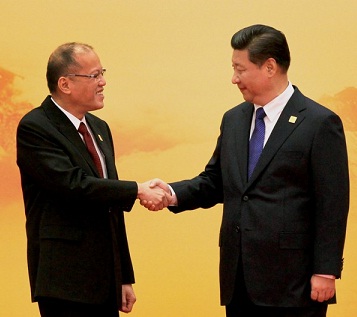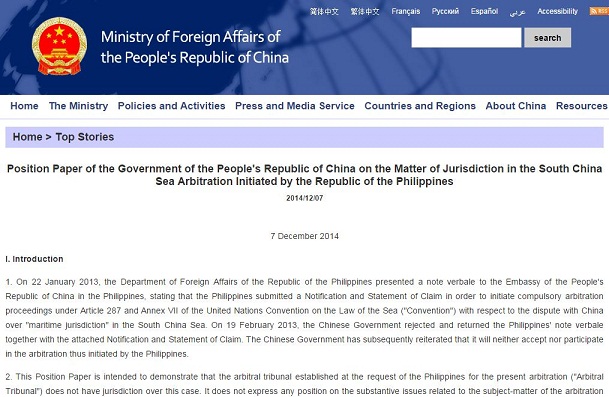
The meeting between President Aquino and Chinese President Xi Jinping may have lowered the tension but the two countries are really far apart in attitude and perspective.
Example:
Before the meeting of Leaders of the Asia Pacific Economic Cooperation in Beijing last month, Foreign Secretary Albert del Rosario said their bringing unilaterally the territorial conflict with China before the U.N. court is not an unfriendly act.
China has refused to participate in the U.N. suit, the first ever filed against the economic superpower, insisting instead on bilateral negotations which the Philippines shunned.
“We precisely selected arbitration because, as was defined by the United Nations, it is not an unfriendly act. It is, as a matter of fact, one that we are utilizing to be able to preserve a valuable friendship,” del Rosario said.
That’s not how China sees it.
 In it’s position paper released a week before the Dec 15 deadline set by the U.N. court for China to submit a comment on the Philippine complaint, China said if both parties in the conflict agreed to bring the issue for arbitration to the U.N., that is not an unfriendly act. But that is not the case with the Philippine complaint.
In it’s position paper released a week before the Dec 15 deadline set by the U.N. court for China to submit a comment on the Philippine complaint, China said if both parties in the conflict agreed to bring the issue for arbitration to the U.N., that is not an unfriendly act. But that is not the case with the Philippine complaint.
” China does not consider submission by agreement of a dispute to arbitration as an unfriendly act. In respect of disputes of territorial sovereignty and maritime rights, unilateral resort to compulsory arbitration against another State, however, cannot be taken as a friendly act, when the initiating State is fully aware of the opposition of the other State to the action and the existing agreement between them on dispute settlement through negotiations.
“Furthermore, such action cannot be regarded as in conformity with the rule of law, as it runs counter to the basic rules and principles of international law. It will not in any way facilitate a proper settlement of the dispute between the two countries.
Instead it will undermine mutual trust and further complicate the bilateral relations.”
The 27-page Position Paper repeatedly and consistently underscored the lack of jurisdiction of the U.N. Arbitral Court on the Philippine suit.
The U.N Arbitral Court is not for territorial disputes and conflicts concerning a country’s sovereignty which are under the jurisdiction of the International Court of Justice (ICJ).
In the ICJ, however, both countries should agree to bring their conflict for arbitration.
The U.N. International Tribunal on the Law of Sea deals with interpretation of the U.N. Convention on the Law of the Sea signed by 165 countries including the Philippines and China.
China accused the Philippines of circumventing the limitations of U.N. Arbitral Court.” In an attempt to circumvent this jurisdictional hurdle and fabricate a basis for institution of arbitral proceedings, the Philippines has cunningly packaged its case in the present form. It has repeatedly professed that it does not seek from the Arbitral Tribunal a determination of territorial sovereignty over certain maritime features claimed by both countries, but rather a ruling on the compatibility of China’s maritime claims with the provisions of the Convention, so that its claims for arbitration would appear to be concerned with the interpretation or application of the Convention, not with the sovereignty over those maritime features. This contrived packaging, however, fails to conceal the very essence of the subject-matter of the arbitration, namely, the territorial sovereignty over certain maritime features in the South China Sea.”
China summarized the Philippine position thus:
First, China’s assertion of the “historic rights” to the waters, sea-bed and subsoil within the “nine-dash line” (i.e., China’s dotted line in the South China Sea) beyond the limits of its entitlements under the Convention is inconsistent with the Convention.
Second, China’s claim to entitlements of 200 nautical miles and more, based on certain rocks, low-tide elevations and submerged features in the South China Sea, is inconsistent with the Convention.
Third, China’s assertion and exercise of rights in the South China Sea have unlawfully interfered with the sovereign rights, jurisdiction and rights and freedom of navigation that the Philippines enjoys and exercises under the Convention.
China said the essence of the the Philippine suit is the territorial sovereignty over several maritime features in the South China Sea, which does not concern the interpretation or application of the Convention.
“It is the view of China that the Arbitral Tribunal manifestly has no jurisdiction over this arbitration, unilaterally initiated by the Philippines, with regard to disputes between China and the Philippines in the South China Sea.”
Be First to Comment